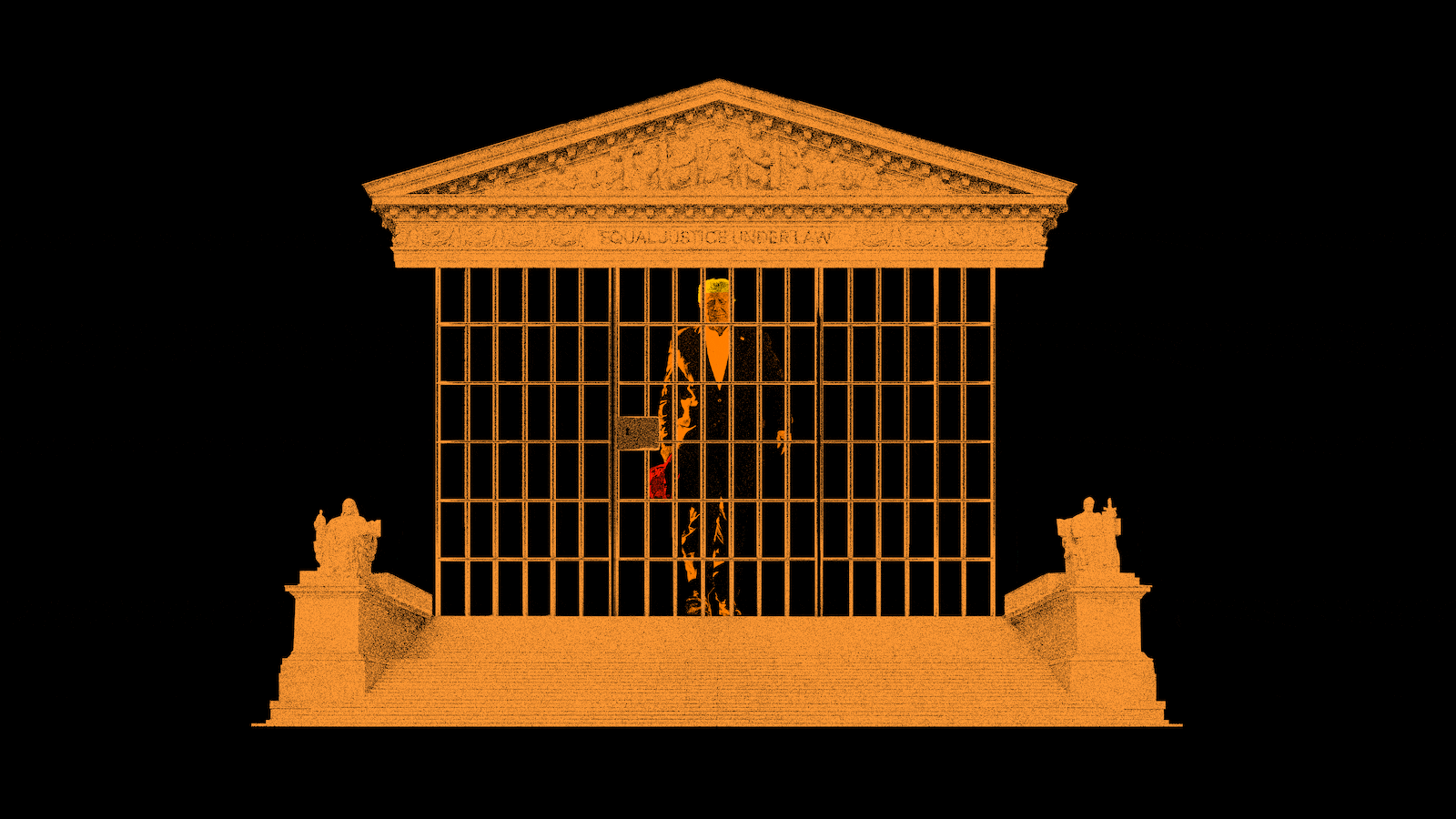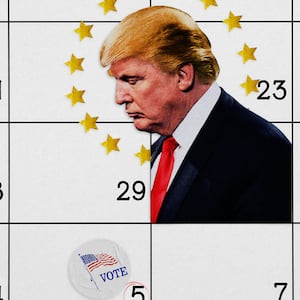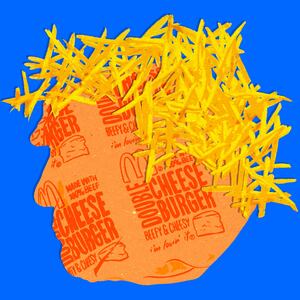Despite a commonly held belief that the right-leaning U.S. Supreme Court can’t save Donald Trump from his recent criminal conviction in New York, due to it being a state case, the former president’s team could still try to divert the case away from Manhattan and to the nation's highest court instead—a long-shot strategy that might yet throw this year’s election further into chaos.
Much depends on New York Supreme Court Justice Juan Merchan. The harder he punishes Trump—with jail time, for instance—the greater the likelihood lawyers for the presumptive Republican presidential nominee will stage an end run of the state justice system and head straight to Washington.
What matters is whether Trump’s defense team, led by attorney Todd Blanche, tries something of a Hail Mary pass: claiming Trump’s treatment in New York somehow violated his Fifth Amendment right to a fair trial.
Legal scholars are bracing for Trump’s lawyers to make that argument in an attempt to gauge the interest of the conservatives on the U.S. Supreme Court, who outnumber the liberals 6-to-3. Experts awaiting Trump’s promised appeal of the sentence Merchan is expected to deliver on July 11 are keeping a lookout for the telltale sign: any mention of federal civil rights.
“Absolutely!” said Alan David Marrus, a former New York state judge. “If I were the lawyers who were representing Trump—and no one has asked me to do that—I’d be sure to write in my briefs to the appellate division that some constitutional right like due process was violated. If they don’t argue this in state court, they’ll never get this into federal court.”
The traditional route would take months, particularly when the state appeals court is on its summer break and set to hear any case in October, in the closing days of the presidential election campaign.
In a normal scenario, Trump would work his way up the state appellate division’s First Department in Manhattan, then the state’s higher (and confusingly named) Court of Appeals before starting from the bottom again in the federal realm by suing in Manhattan federal court, then proceeding to the Second Circuit Court of Appeals, and finally the Supreme Court in Washington.
But there’s a workaround—one that could take Trump straight to the top.
The most obvious avenue is a petition for a “writ of certiorari,” essentially asking the Supreme Court to weigh in on an extremely pressing matter.
The bar is quite high, which helps explain why it’s sometimes the route used by death row inmates. Most requests for emergency action typically go to the justice assigned to a particular circuit—in this case Sonia Sotomayor, the left-leaning former New York federal judge who has ruled against Trump in almost every case that has come before her.
But the Supreme Court’s own published rulebook says the petitioner—in this case, Trump—”may renew the application to any other justice of his or her choice, and theoretically can continue until a majority of the court has denied the application.” That means Trump can keep chugging on the slot machine until the right justice pops up.
At that point, the full court would consider whether to take up the case. It only requires four justices to grant certiorari and five to “grant a stay,” pausing any punishment Trump faces—be it a jail sentence, probation, or even community service picking up cigarettes from the dirty park across the street from the courthouse, where protesters gathered during his trial.
Jill Konviser, a retired New York criminal court judge, expects Trump’s lawyers to plant the seeds of a federal end run in the coming weeks.
Konviser asserts that Trump did indeed get a fair trial. After all, it lasted seven weeks, during which the judge repeatedly held off on jailing Trump for intimidating jurors and witnesses; the case went to a jury that considered it for days; and Trump presented little evidence and did not even testify.
But the former judge stressed that the Supreme Court could exercise its extremely powerful authority to grab the case anyway.
“Presumably when drafting the appeal, the defendant will sprinkle any possible federal constitutional issues in his papers hoping to pique the interest of the Supreme Court,” Konviser said. “While it is difficult to see a federal constitutional claim here, the Supreme Court is just that, supreme.
“And so if they say there’s a federal question, well then, I guess there is. Their discretion is broad, and they have the last word. Appeals courts are right because they are last, not necessarily last because they are right.”
In some ways, Trump’s criminal trial in New York was a garden-variety fraud case. Jurors unanimously determined he faked business documents to cover up another crime. As prosecutors presented in court, Trump orchestrated a $130,000 payoff to keep the porn star Stormy Daniels from going public about her claim of an extramarital affair, a disclosure that could have harmed his 2016 presidential campaign.
But the way prosecutors structured those 34 criminal charges—qualifying them as felonies because the falsification of business records was done to hide a second crime, namely election fraud—could raise questions certain Supreme Court justices could think worthy of considering.
Marrus, the former judge, said, “A lot of commentators have said the case Trump was tried on, no one’s been prosecuted for a crime like that before. That’s the argument his lawyers will be sending: In the history of New York jurisprudence, nobody has been prosecuted for a felony based on an election law violation where the intent was to violate the right of the people to decide an election, perpetrating a fraud on the electorate.”
The rarity of the situation isn’t a surprise. Adulterous fraudsters don’t typically reach the pinnacle of American politics, engaging in a cover-up along the way. But the novelty of this moment in history could ensure an equally historic decision from the highest court.
Several experts noted that Trump’s team could raise a few legal issues.
One is the constitutionality of Justice Merchan’s gag order, which continues to prohibit Trump from using heated political rhetoric against prosecutors who were in the courtroom at trial, jurors, or court staff.
Another is whether the judge incorrectly instructed the jury by not telling them they had to agree on what specific crime Trump intended to commit when he faked business paperwork—the underlying element that turned his charges of faking business records into felonies.
Even if Merchan was correct in leaving that space blank under New York law, Trump’s team could ask the U.S. Supreme Court to decide that the state’s law is unconstitutional because it’s overly broad or vague.
Even if all these arguments fail, Trump could try one last gambit: wait until he starts serving his sentence then rely on a habeas corpus petition in federal court—the same type of lawsuit that so many undocumented immigrants were forced to file against the U.S. government between 2017 and 2021, when they were arrested while Trump was in the White House.








